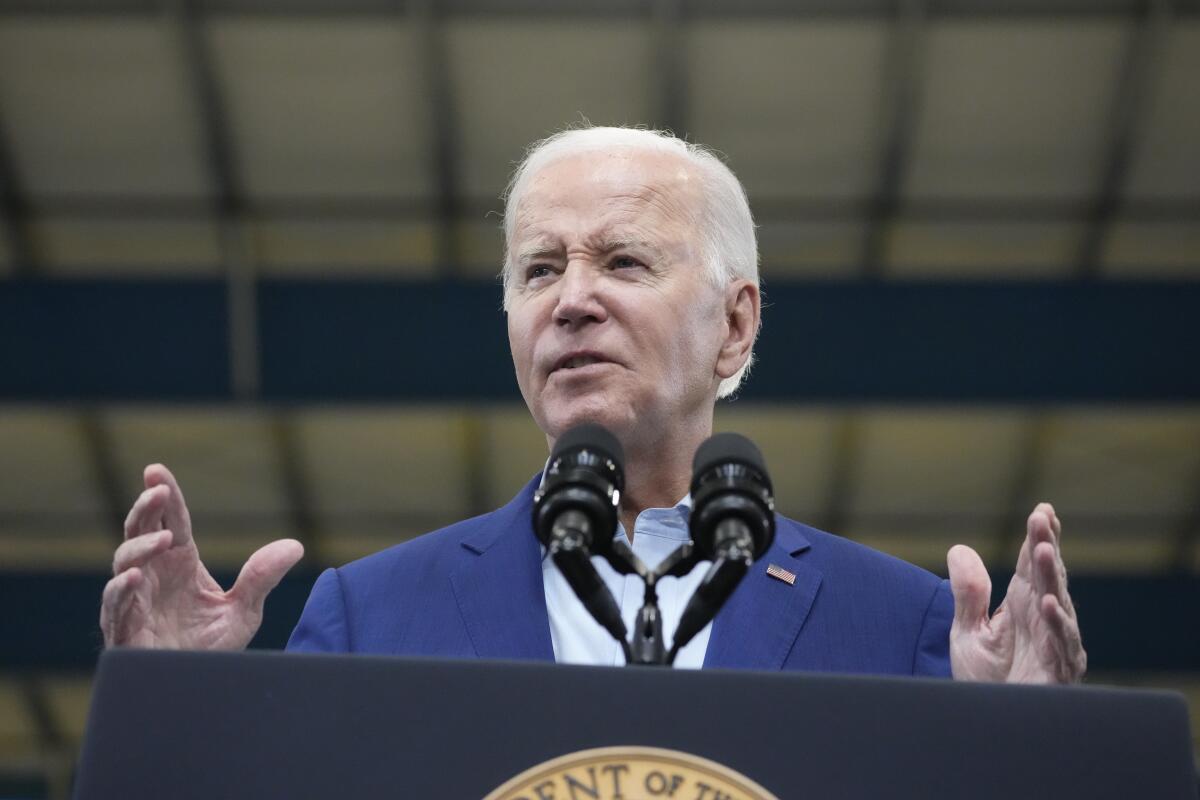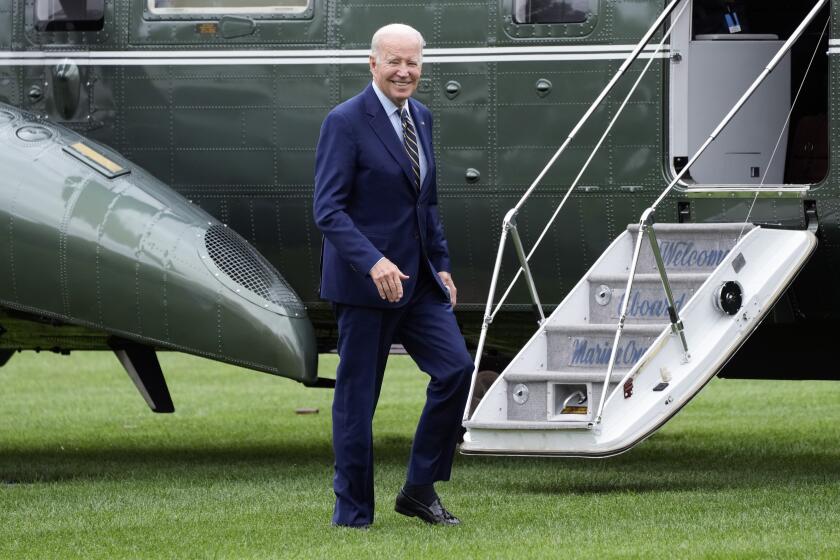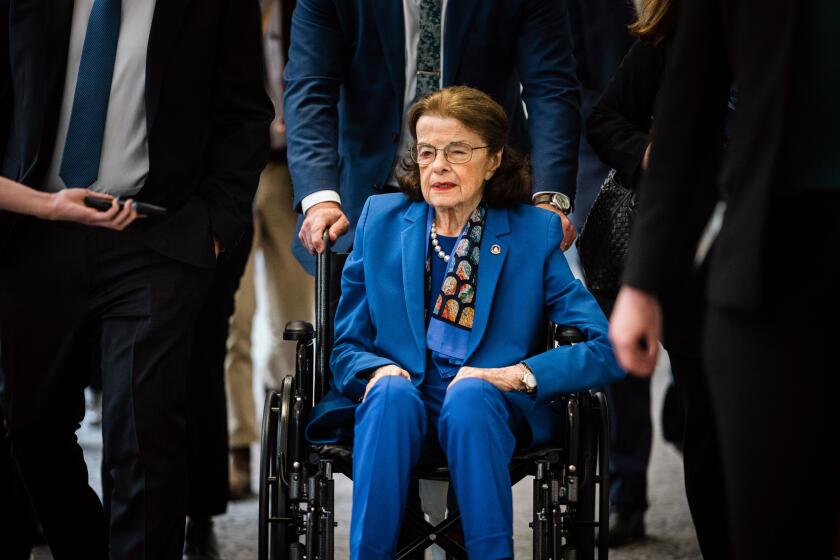Biden makes case for his economic policies at New Mexico wind farm plant

- Share via
BELEN, N.M. — President Biden declared Wednesday that his economic policies are reviving U.S. manufacturing, touring the West to drum up support for his efforts on jobs and inflation in the face of voters’ doubts.
“I’m not here to declare victory on the economy. We have a lot more work to do,” Biden said at Arcosa Wind Towers, a facility that once made Solo cups and other plastics but is shifting to manufacturing wind towers. “But we have a plan. And it’s turning things around.”
Arcosa was a “great example” of how the administration’s legislative achievements have bolstered jobs and investments in the U.S., the president said. The company had to lay off workers in Illinois and Iowa before Biden’s Inflation Reduction Act became law last year, but customers placed $1.1 billion in wind tower orders with the company afterward, according to the White House. The stock has risen more than 20% in 12 months.
“Folks, when I think climate, I think jobs,” Biden said, referring to cleaner energy production.
He pointed to climate-related investments not only at Arcosa but also at major corporations such as General Electric, and said, “Every one of these companies has pointed to the clean energy law that we originated and I signed for making these investments.”
The claim from Biden and the White House that the administration has bolstered U.S. manufacturing is backed by a rise in construction spending on new factories. But factory hiring has begun to slow in recent months, a sign that the promised boom has yet to fully materialize.
President Biden will visit the Grand Canyon, Albuquerque and Salt Lake City to showcase his work on conservation, clean energy and veterans’ benefits.
That hasn’t stopped the White House from telling voters ahead of the 2024 election that the Democratic president’s agenda has triggered a revival in factory work.
“Hundreds of actions coordinated through his entire government are sparking a manufacturing renaissance across the United States,” White House climate advisor Ali Zaidi told reporters ahead of Biden’s speech.
Biden’s message on jobs is one he’s been repeating frequently.
At a Philadelphia shipyard last month, Biden offered his policies to fight climate change by shifting away from fossil fuels as a way to create jobs. He wants voters to think of his social and environmental programs as good for economic growth.
“A lot of my friends in organized labor know: When I think climate, I think jobs,” Biden said then. “I think union jobs. Not a joke.”
Biden’s trip to the Southwest is shaded by his reelection campaign and the challenge posed by a majority of U.S. adults saying they believe the economy is in poor shape. The president is trying to break through pessimism that intensified last year as inflation spiked. His trip included a Tuesday speech in Arizona and will end with remarks Thursday in Utah. In 2020, Biden won Arizona and New Mexico, key states that he probably needs next year to secure another term.
The president does have a case to make to the public on employment. As the U.S. economy has healed from the COVID-19 pandemic, hiring has surged at factories. Manufacturing jobs have climbed to their highest totals in nearly 15 years. This is the first time since the 1970s that manufacturing employment has fully recovered from a recession, expanding by 789,000 jobs since Biden took office.
California’s Sen. Dianne Feinstein has left the hospital after a ‘minor fall’ in the kitchen of her San Francisco home.
But the pace of job growth at manufacturers has slowed over the last year. Factories were adding roughly 500,000 workers annually last summer, a figure that in the government’s most recent jobs report fell to 125,000 over the last 12 months.
Biden administration officials have said there are more factory jobs coming because of its infrastructure spending, investments in computer chip plants and the various incentives in the Inflation Reduction Act.
Their argument is that the incentives encouraged the private sector to invest, leading to $500 billion worth of commitments to make computer chips, electric vehicles, advanced batteries, clean energy technology and medical goods. They say more factories are coming because, after adjusting for inflation, spending on factory construction has climbed almost 100% since the end of 2021.
In April, the Economic Innovation Group, a public policy organization, issued a report that called construction spending for factories a “nationwide boom.” The report notes there are signs that manufacturing gains are most prominent outside the Midwest, which has historically identified with the sector, as more plants open in Southern and Western states. But the group is less sure that a full-fledged restoration of manufacturing is in the works as the sector has been in decline for decades.
Labor Department figures show that total factory employment peaked in 1979 at nearly 19.6 million jobs. With just under 13 million manufacturing jobs now, the U.S. is unlikely to return to that level because of automation and trade.
The expansion into other cities, including to San Francisco, San Diego and San José this week, indicates that more migrant families will be pushed into the program.
Adam Ozimek, chief economist at the Economic Innovation Group, said jobs can be a flawed way to measure a manufacturing revival. He said better metrics include an increase in factory output, whether the U.S. can shift to renewable energy to blunt climate change and whether the government can achieve its national security goals of having a stronger supply chain.
“It’s way too early to declare anything like a manufacturing renaissance,” Ozimek said. “We are decades into structurally declining manufacturing employment. And it’s not at all clear yet whether the positive trends are going to outweigh that continuing head wind.”
And Jay Timmons, president and chief executive of the National Assn. of Manufacturers, alleged that federal rules were hampering any benefits of the Biden administration’s manufacturing policies.
“The positive impact of manufacturing investments made during the Biden administration are being undermined by a rising tide of complex and often unbalanced federal regulations,” he said on the social media platform formerly known as Twitter, adding that Biden “must take action to ensure a balanced regulatory regime.”
The Inflation Reduction Act has been the centerpiece of Biden’s climate agenda. However, he’s been under pressure from some activists and progressives to declare a national climate emergency, which he was asked about in an interview with the Weather Channel while visiting the Grand Canyon in Arizona on Tuesday .
Biden said he’s already done that “practically speaking,” citing the legislative steps and executive action that he’s taken.
“It is the existential threat to humanity,” he said.
Associated Press writers Darlene Superville and Seung Min Kim in Washington contributed to this report.
More to Read
Sign up for Essential California
The most important California stories and recommendations in your inbox every morning.
You may occasionally receive promotional content from the Los Angeles Times.
















